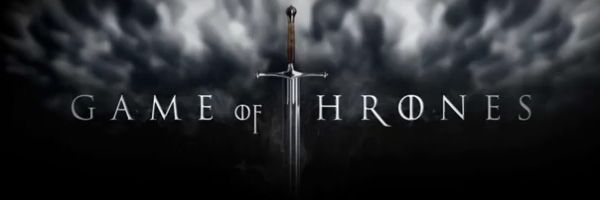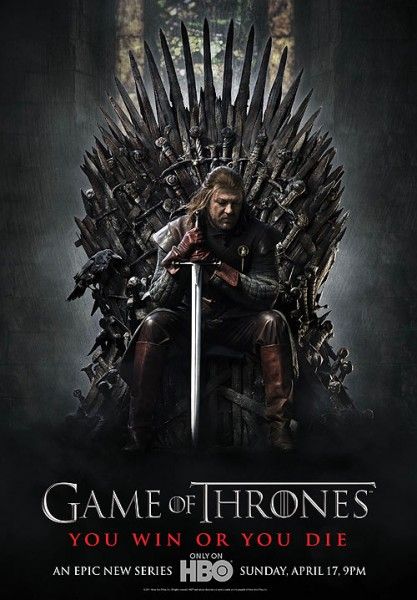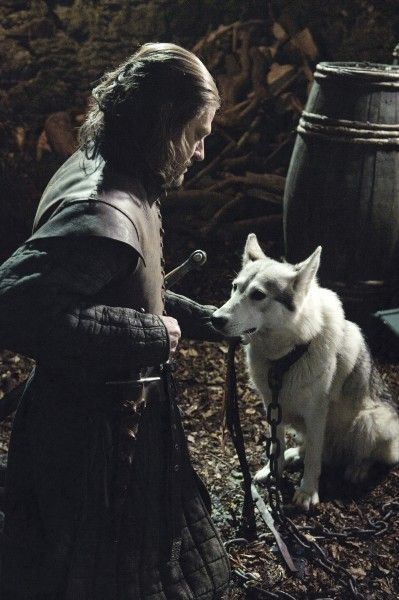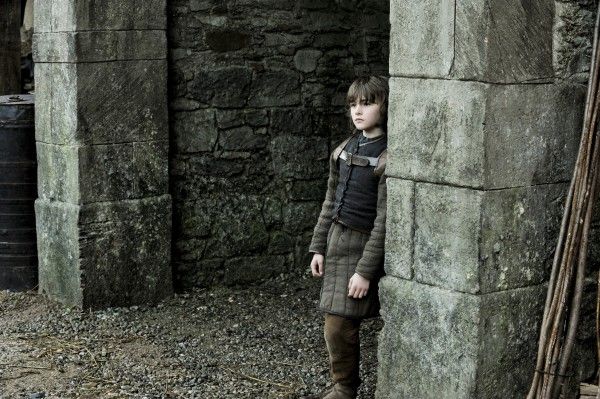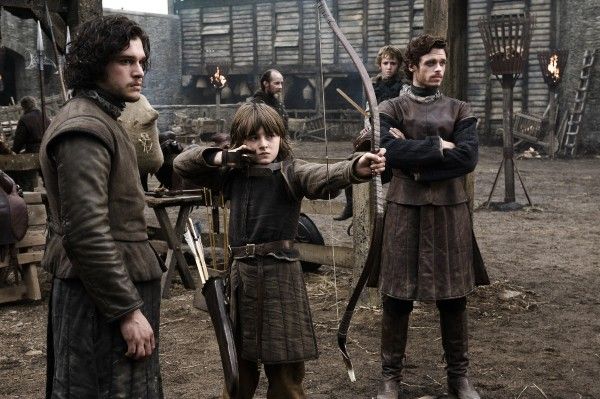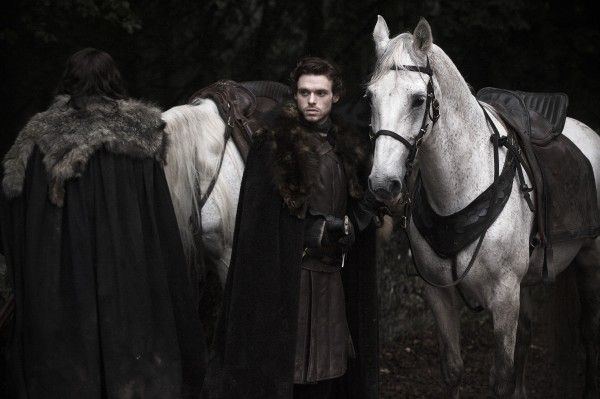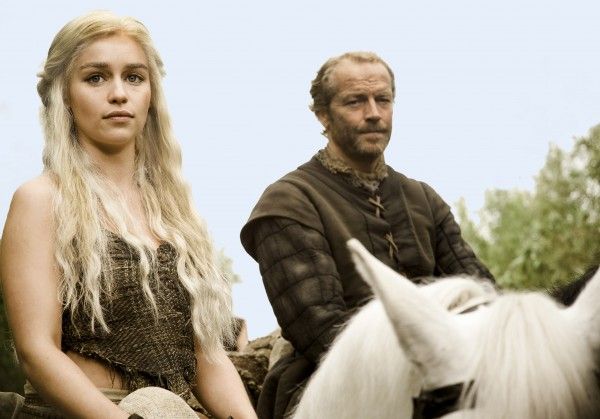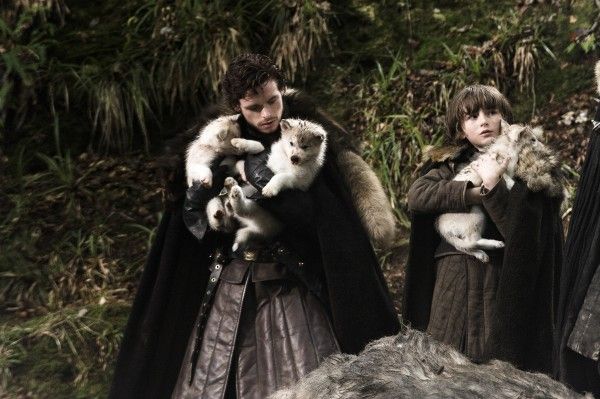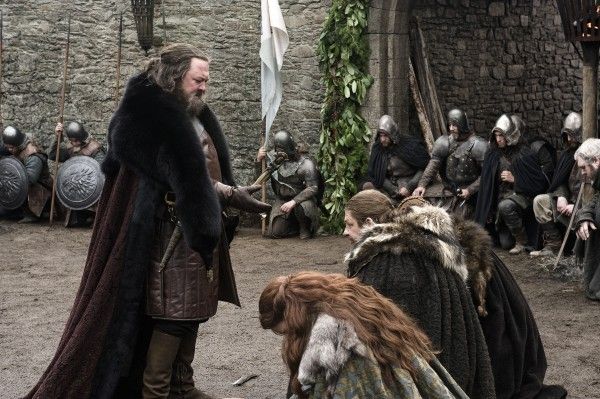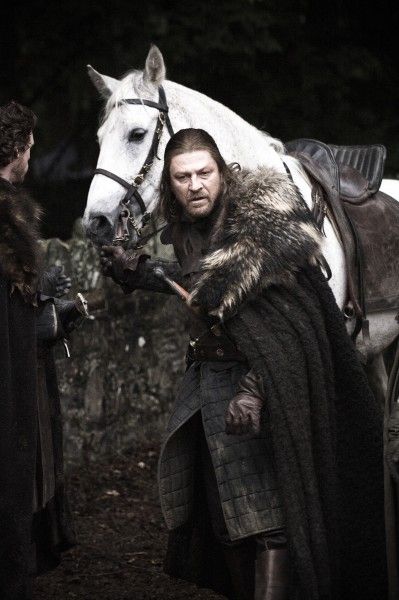Based on author George R.R. Martin’s best-selling A Song of Ice and Fire series of books, the HBO epic drama series Game of Thrones is a magnificent and brutal fantasy about two families who are engaged in a deadly battle for power and control. Although it takes place in another time and world that appears to be very foreign on the surface, the struggles are surprisingly universal and so intriguing that you will be immediately hooked and in for the 10-episode ride of Season 1.
During a recent interview, George R.R. Martin talked about the process of bringing his written words to the screen in a way that he never could have imagined, the experience of turning over his long-time work to the producers of the series (David Benioff and D.B. Weiss), how thrilled he is with what he’s already seen of the final product, his desire to do a cameo at some point, the Twitter battle that started when executive producer Damon Lindelof started when he heard he didn’t like the ending of Lost, and how he hopes to finish the book series before the TV show catches up. Check out what he had to say after the jump:
For those not familiar with the story, here is HBO’s synopsis:
Summers span decades. Winters can last a lifetime. And the struggle for the Iron Throne has begun. It will stretch from the south, where heat breeds plots, lusts and intrigues; to the vast and savage eastern lands; all the way to the frozen north, where an 800-foot wall of ice protects the kingdom from the dark forces that lie beyond. Kings and queens, knights and renegades, liars, lords and honest men . . . all will play the Game of Thrones.
If you would like to learn about the Seven Kingdoms of Westeros, HBO has posted an official viewer’s guide here that you might want to check out prior to viewing the series. And because author George R.R. Martin was so generous with his time, I’ve broken down the interview with a list of the 10 coolest highlights. A full transcript of the interview follows.
- When he began the Song of Ice and Fire series in 1991, he never imagined that his work would be able to be adapted for film and television
- He was first approached about adapting his books after the release of the second book, A Clash of Kings
- He gave some insights to producers David Benioff and D.B. Weiss about where he’s headed with the books, so that they knew where the story was going
- There is one character who dies in the first season of the television show, who does not die until the third or fourth book, and who dies differently
- He wrote Episode 8, called “The Pointy End”
- He filmed a cameo in the Dothraki wedding scene, but was cut when all of the footage from Morocco ended up on the cutting room floor, only to be re-shot in Malta without him
- Natalia Tena, who plays Osha, has really made him rethink that character, for when she returns to the story in the book
- He’s concerned with how some of the battle scenes will be brought to life, but has faith in Benioff and Weiss, who he feels have tackled everything so far
- He’s very impressed with the marketing machine behind the series, as he never experienced that when he was working on Beauty and the Beast and The Twilight Zone
- Because he likes to take his time with the work, he hopes to have the last two books in the series (#6 and 7) finished before the show catches up
Question: When you were creating these books, did you ever think that you’d someday get to see them brought to life?
GEORGE R.R. MARTIN: No. In fact, when I began this series, I thought, “This could never be adapted for television or film.” I was simply writing a book. I started this in 1991, right in the middle of 10 years that I spent in Hollywood. I came back to it in ‘94, when my Hollywood involvement was on the wane. I’d been told, over and over again, during those periods when I was developing pilots and writing feature films, “You’re making everything too big and too expensive.” I’d always get, “George, this is a great script, but it would be three times our budget. You have to cut it down.” And then, I would go back and cut it down. But, I was tired of cutting things down. I was tired of taking out prose and some of the big sequences that I thought really made some of these projects special. I came from the world of prose, before I was ever involved in television or film. I had spent 15 years writing short stories and novels, so I was returning to my first love. I knew that, when writing a book, you’re not constrained by a budget. You’re not constrained by what you can do, in terms of the special effects technology. You’re not limited to any particular running time. You can have a massively long story, or you can have a story with all sorts of scenes, settings and battles, and a cast of characters in the hundreds or even thousands. That’s what I did. I said, “I’m just going to write the best book I can, and it’s probably only ever going to be a book, but that’s fine with me. I love books. And, hopefully, it will be a successful book.” So, all of this has come as a real thrill, but there’s a certain irony to it, at the same time, especially when you consider that, from 1990 to 1995, I was doing everything I could to create something that could be a television series. I wrote six pilots, none of which ever got picked up. When you stop trying, it then it falls in your lap.
How many times, and over how long a period of time, have you been approached about bringing these books to life? And, at what point did you realize that it really could be done and that these guys were going to be very faithful to your work?
MARTIN: Well, I was approached mostly after I first started getting inquiries when Clash of Kings came out, which was the second book in the series. That was the first book to actually hit the best seller list, so that stirred up interest. I don’t remember the exact number of times. Some of the calls we got were just people wanting to read a copy, and nothing more came of it than that. Others wanted to have a meeting. I had a couple of meetings, when I was out in Los Angeles, on a few trips. I had a few phone conferences. And, of course, my agents handled more calls than that. But, in the early days, it was all people who wanted to do it as a feature film. They were looking at the success of The Lord of the Rings movies by Peter Jackson, and thinking, “Well, if it happened for one fantasy, perhaps it could happen to another.” I know a lot of the other people who were writing epic fantasy, around that time, also had books that were optioned or purchased for feature films, very few of which have ever come out. But, I knew right from the start that it couldn’t be done as a feature film. It’s simply too big. These are longer books than Tolkien’s books. They have a far larger cast of characters. So, while I did entertain a few meetings in those early days, none of them led anywhere, and I really didn’t want them to lead anywhere. The only approaches I heard, as to how to do it as a feature film, really involved truncating the story, eliminating three-quarters of the characters, and focusing on this storyline or that storyline. And then, the meeting with David and Dan happened and I realized that they both had the same notion that the only way to really do this was for television, and ideally for someone like HBO, that would allow us to do adult fare and to devote an entire season to each of the novels. That was really the big breakthrough.
Is it difficult at all to pass over the control of this story, in turning it into a television series?
MARTIN: Yeah, to some extent it is. I’ve used the analogy that it’s a little like sending your kids off to school, for the first time. They’re your kids and you’ve had them since they were born, and you’ve been in total charge of them and been with them 24 hours a day, and now they’re going off for a large part of the day to school and who knows who they’re going to meet there or what influences are going to happen. It’s a bit of an empty nest syndrome there, but you have to deal with that. The only thing you can do is make sure you put them in the hands of good people. I have a great relationship with David and Dan. This whole process really got going when I met them. I liked everything they said, and I think they liked what I had to say. I’ve put them in the hands of the best people I can find, and that’s the same with the actors and the directors. They’re all taking good care of my kids, as far as I can tell. Knock wood that that continues.
How do you feel about what you’ve seen of the television series?
MARTIN: I’ve only seen the first two episodes, but I’m thrilled. I think they’re great.
In the early phases of their writing, how much information did David and Dan ask for, in regard to stuff that wasn’t necessarily on the page in your books?
MARTIN: They asked a few key questions and I supplied them with some information. In that sense, David and Dan probably know more about where I’m going with this and what the eventual end will be and what some of the later revelations down the road are going to be than anyone else because they wanted to know, rightly so, where they were going. So, we communicated, had a number of phone calls and exchanged emails, in the early days. That first meeting of ours was epic. We met for lunch in the Palm Restaurant in Los Angeles and we were still talking when they were setting up for the dinner service. Our lunch went four or five hours there.
Did they ask you about changing things that aren’t necessarily seen or heard in the books? Did they run ideas by you to make sure that it fit with the overall universe, or did you just give them that lee-way?
MARTIN: I knew they wanted to do the stories, but I couldn’t really dictate. I didn’t want them to feel that I was just peering over their shoulders saying, “No, no, no, that line won’t work.” You have to give them freedom to do their own thing. They had the book, and I knew they were going to stick fairly close to the book. Given the parameters that we had, I knew what was going to be in the pilot and where it was going to end. It has a pretty strong cliffhanger ending. We were all on accord on that. Initially, all they wrote was just the pilot.
Have they talked to you about altering any of the characters?
MARTIN: There have been a few conversations about that. I don’t want to get too specific because it would spoil things, but there is one character who dies in the first season of the television show, who does not die in the books until the third or fourth one, and who dies differently than the way they had him dying. I flagged them to that, so that they were aware of it, but they decided to go ahead and keep their take on it. So, if we get to a third season, and to the place where that character originally died, and we haven’t diverged too much from the main storyline, they will have to make some sort of corresponding adjustment there because they will no longer have that character around, to kill a second time. We have to be careful of stuff like that. Hopefully, I can be of use to David and Dan, by telling them when they’re running into something like that.
Have you written any episodes for the show?
MARTIN: I did write an episode of the show. I wrote Episode 8, “The Pointy End.”
Was it at all strange or difficult to get back into the mind frame of these characters, at the beginning of their story?
MARTIN: No, not really. I’ve wondered whether it would be, but the world and the characters are so familiar to me that it was actually pretty easy. The hardest part about writing the script was getting used to the new screenwriting software that I had to use. It’s been about a decade since I’d last written a teleplay and, of course, I had used a different software back in my day, so I had to make certain accommodations to get used to the new standard. But, once that was over, it went fine. I knew the story pretty well and I had some good scenes to adapt, so it was fun.
Were there any sets or characters that just blew you away, actually seeing them come to life?
MARTIN: I had seen the auditions already, so just hearing some of the actors auditioning by reading certain scenes from the books had set the template for me. I knew what to expect because I’d already seen almost all of them performing as the characters, but it was still a great thrill to see them on the screen. I think we have an amazing cast. Mark Addy is great as Robert. Some of the people who really impressed me the most were the kids. It’s very hard to find a good child actor. There are a lot of child actors out there, especially in America, and they’re cute kids, but most child actors appear on sitcoms where their main role is to be cute and make funny little remarks, and some of them do that very well. But, the children in Game of Thrones are required to do a great deal more. This requires some really serious acting chops. They have to convey fear, grief, love and yearning, in parts that would be challenging for even an adult actor with 10 or 20 years experience, and these are young kids who have done a few school plays. They were hard to find. We looked at hundreds of kids, for each of these roles, and I don’t know where our casting director found the kids that she did, but it’s amazing. All of them are great. The three principle kids – Isaac Hempstead-Wright (as Bran), Sophie Turner (as Sansa) and Maisie Williams (as Arya) – are all amazing.
Can you talk about the casting for Jon Snow, who’s played by Kit Harington, and Tyrion Lannister, who’s played by Peter Dinklage?
MARTIN: The casting of those two characters, in particular, were very different. When I had that initial meeting, five years ago, with David and Dan, we kicked around some casting ideas for some of the usual dream casting that we’d had in mind. There were two characters that we were all in perfect accord with, even five years ago, and that was Sean Bean as Ned Stark and Peter Dinklage as Tyrion Lannister. They were our first choices and, really, our only choices, far and away, for those roles. We never even auditioned for the part of Tyrion Lannister. Peter Dinklage was the only one we ever wanted. We knew he would be great for the role and, thankfully, we landed him. He’s magnificent. He’s a fabulous addition to the show and he’s a joy to work with. The part of Jon Snow was much different. We kicked around a few names for it, but we really didn’t have anyone strongly in mind. It’s a younger role, so you need an actor who’s relatively new. We looked at a lot of young British actors for that part. Some of the actors who are playing smaller roles in the show initially came to our attention because they read for the part of Jon Snow. We looked at many people, and Kit Harington really, really stood out. He was one of the strong contenders, right from the first. He had a great look for the character. His performance was wonderful. Prior to that, his biggest thing was the British stage play called War Horse, which I believe has just come to Broadway as well. He was very acclaimed in that, and we knew about that. He was a fabulous find for us. In a general sense, I was involved in the casting, right from the beginning. I suggested many actors to David and Dan. All of the auditions were done on tape and posted on a website, so I would go onto the website and review the daily readings for the roles, and then I would email David and Dan with my thoughts. I had a voice, but it’s not like I had a veto or anything. Sometimes we disagreed and we would have spirited arguments, not just with David and Dan, but also HBO, the casting director, the directors and the producers. There were many people involved in the casting process, but I was certainly one of them, right from the beginning, on pretty much every role.
Now that you’re working on A Dance With Dragons, have you caught yourself approaching characters differently, having seen the performances from these actors?
MARTIN: The only actress who’s really made me rethink a character is Natalia Tena as Osha. She’s younger, more attractive and more dynamic than I had initially written that character. And, when Osha comes back into the story, as I hope that she will, I’m definitely going to take that into account. Other than that, I don’t know. There may be some sort of subconscious influence, but I don’t think it’s going to be a major factor. It does occur to me, while I’ve been finishing A Dance With Dragons, that I sometimes have these moments when I’m doing horrible things to characters, where the actor comes to me and I find myself thinking, “Oh, god, what am I doing to this perfectly nice person here? They’re going to have to act out this horrible scene that I’ve just written for them.” But, thankfully, most actors seem to thrive, the more you do terrible things to their character. It gives them a chance to really show their acting chops. So, I think that they’ll do just fine, when they get to some of this stuff.
With such an impressive marketing machine behind the show, is there anything that you’ve seen that you were particularly surprised by?
MARTIN: It’s been one surprise after another. Of course, I knew that they would promote the show. I’ve been on television shows before, so I expected that there would be posters on buses and in subway stations in major cities, and that there would be ads in magazines, and that there would be teasers and trailers on television. But, food trucks? A traveling Iron Throne? The display at the HBO store in New York City? These are things that I never experienced on Beauty and the Beast or Twilight Zone, or any other project that I’ve worked on. And, we’re not even done yet. I know they have some stuff in mind that hasn’t rolled out yet, that also sounds pretty amazing. It’s been a long, strange trip.
Are there any specific characters or events from the book that you think will be particularly difficult to adapt for TV, especially as the story progresses?
MARTIN: Well, I’m worried about some of the special effects-heavy scenes. I haven’t seen those yet. I’m very anxious to see the last scene of the first season. I don’t want to reveal any spoilers here, but if you’ve read the book, you know what the last scene is. So, I wonder how that will come across and how the effects will hold up. And, I wonder about some of the battles that occur. We have a couple of major battles in this, like the Battle of Whispering Wood and the Battle of the Green Fork. It’ll be interesting to see how they do on screen. Those are something we never could have done at all, in the days when I was more active in television, but now they’ve become a little more plausible, thanks to computer special effects and CGI, even though they’re still expensive and time consuming to do. That’s going to be a challenge for us. I also sometimes look ahead to if they are lucky enough to get a second, third and fourth season. I have some huge set piece things coming up, in those seasons. The Great Battle of the Black Water is fought mainly on the river, with the skies alive with wildfire, and thousands of people struggling. How are we going to do that? That’s going to be quite a challenge for us, in the future years, but David and Dan have so far proved themselves up to the challenge. There’s also some of the fantasy elements, in later seasons, particularly with the skin changing, where certain characters inhabit the mind of a wolf, or of some other animal. How do you actually show that on screen? How do you sell the idea that here’s the Dire Wolf, or some other animal, but it now has one of our characters inside it? How do you show the face changing? Some of these magical things really have to have a great deal of thought behind them. So, if the series is successful and we go forward, David and Dan will have their work cut out for them. But, thankfully, it’s not my job to solve these problems. It’s just my job to create the problems, and then David and Dan get to solve them.
With your fans being so avid, how do you think the reaction will be to some of the changes, specifically some of the details that have been eliminated to transform the story into a television series?
MARTIN: Well, if my own reaction is any key, I think the vast majority of my fans are going to be thrilled and delighted by what they see. I think 95% will be very happy. They may have a quibble, here and there, where they say, “You left out my favorite scene,” or “You left out this great line.” But, their overall reaction will be very positive. I’m sure it will just be a small minority that will not like it, for various reasons. Some won’t like it just because they don’t like a particular actor, or they don’t like the story. I admire the passion, and there are some people who are very passionate and know these books, inside and out, and know every detail, but they are not going to be able to get over the fact that things are changed and that there are omissions. As I watched the first two episodes, I thought all the scenes that were taken from the books and adapted seemed to work wonderfully for me, and I was very pleased with the new scenes as well. The only time that I had any little bump is with the missing material. Someone who knows the books very well, will watch and say, “Okay, now this scene is coming up. This is what’s going to happen next. Oh, wait, they took out that scene. We didn’t get to see that happen.” I was a little disappointed by that, but at the same time, I understand why that happens and I would probably have done the same thing, if I was David and Dan. We have an hour, and we have to get a certain amount of the major events in, in that hour. We don’t have three hours for each episode. We have ten hours to tell the entire story of Game of Thrones, so you can’t put in every little detail, every line of dialogue that’s in the book, or even every scene. You are going to lose some material, along the way. Now there are certain scenes that I believe were shot whole or in part that didn’t make it into the final cut. Perhaps HBO will eventually provide some of those scenes for people to see, on the DVD and Blu-ray that comes along later. For the material that was never shot at all, it’s there in the books, so maybe the people who like the show will go pick up my books and they’ll find a director’s cut, right there in prose of all the material that wasn’t in there. It is two different mediums, and they operate under different constraints.
In creating this world, did you start out with one family and then branch off into the rest of the world?
MARTIN: Well, the Starks are certainly the center of the story, when it begins. It all begins at Winterfell, with occasional cuts to Daenerys across the ocean, because there was no way I could get her into Winterfell. But, we bring all the characters together at Winterfell, and they’re all there for a while before they start to go their separate ways. By the time you’re done with the first book, pretty much all of them have gone their separate ways. There are no two characters together anymore. From that point forward, the story spreads and grows progressively larger. I also introduce more characters, players and factions, in later books, to thicken the plot a little more. But, the Starks are the center of the book and, to a lesser extent, the Lannisters. They are still the major players. I write from this tight third-person viewpoint, where each chapter is seen through the eyes of one individual character. When I’m writing that character, I become that character and identify with that character. So, when I’m writing a Tyrion chapter, I’m in love with Tyrion. And then, when I switch to Jon Snow, I’m in love with him. Same with Daenerys. Even the characters who are perhaps not the nicest people in the world, and who are deeply flawed and might even be considered villains, if I am writing from their viewpoint, I have to identify with them. Nobody is a villain in their own story. We’re all the heroes of our own stories. So, when I am inside the head of a character who would otherwise be considered a villain, I have a great deal of affection for that character and I’m trying to see the world and the events through their eyes.
What characters do you find the most difficult to write for, and why?
MARTIN: The hardest of the viewpoint characters to write has been Bran, for two reasons. One is his age. He is the youngest of my viewpoint characters, and it’s difficult to write from the point of view of a child. It’s not impossible, but it slows down the process a little. You have to think about everything that’s going on and ask yourself, “How would an 8-year-old see this? How would an 8-year-old describe this? He would not use the same words as a 30-year-old. He might not understand certain things, even though he’s seeing them or hearing them. He might not understand the context of what he’s seeing or hearing.” You have to look at all that. It makes it a little slower and requires a little more care to write about a character that young. That’s one reason that I did not have a viewpoint for Rickon, who is the youngest of the Stark children. He’s only three years old in the book. They’ve aged him up to six for the TV show. Writing about Bran, who is eight, was difficult enough. Writing about a 3-year-old would have been very, very difficult for me, so I elected not to give a Rickon viewpoint. The other factor that made Bran difficult to write bout was that he is probably the character in the early books who is most deeply involved with magic, and magic is central to fantasy. You want to get that sense of wonder and mystery, and give the reader things that they don’t get in ordinary, mundane fiction, but at the same time, it can ruin a fantasy. Too much magic, or magic that’s thrown in, can take over a book and suddenly it becomes all magic and you lose a lot of the inherent human drama, when people are solving their problems with a spell or waving a wand. It’s something that can be done, and I’ve tried to do it as best I could, but it requires a lot of care. For all those reasons, the Bran chapters were the ones that inevitably seemed to take me the most time and involved the most difficulty.
In writing the books, is there one character that you wish you could have killed off, or maybe killed off sooner, but they just became too important to the story to do that with?
MARTIN: No, not really. The main deaths and plot twists have all been planned, since the beginning, but some of these deaths are hard to do. I’ll reach a point where I’m about to write something that’s very hard to write. There’s a part of me that doesn’t want to write it because I’ve become so attached to these characters and I know what’s going to happen to them. But, I’ve known what their fate was going to be since I began the series, a decade and a half earlier, so I go through with it. There hasn’t been any really drastic changes, for any of the major characters or events. Sometimes a minor character has more prominence. I’ll become particularly fond of some minor character, who just squeezes his way on, and then his part gets bigger and bigger. But, they’re still minor characters, ultimately.
Anyone who is familiar with your books knows that you’ve dropped plenty of hints and clues about what’s going to happen, down the road. Will that be apparent in the show as well?
MARTIN: That’s an interesting question. I haven’t seen all the episodes yet. I don’t know how many small little hints, foreshadowing and clues that I plant in the text that David and Dan will have time to include in the television show. I hope some of them many of them make it in. It’s a tricky process because one of my techniques, that I’m able to use, as an author of prose, is to take a tiny but important bit of information, and drop it in among a lot of information that, while it might be colorful and interesting, is not ultimately important, and therefore disguises the importance of the clue that I just give you. That repays the careful readers, who are looking at every word and saying, “Aha! Look at what he said here. It’s buried in this text.” Of course, with a television show, you don’t have that. You have to eliminate a lot of the extraneous stuff and, therefore, if you leave a clue, it becomes a little more prominent because it loses a lot of its camouflage. You’ve got to walk a tightrope there. You don’t want to leave out the clue, but you don’t want to make the clue too prominent, or everybody’s going to guess what the ultimate resolution or plot twist is, that you didn’t actually plan to reveal for two seasons, down the road. That’s part of the challenge of doing an adaptation. So far, David and Dan have been doing it great, and I expect that they’ll continue to do that, but we do discuss it, from time to time. I’ll tell them the importance of a particular bit of business, that otherwise they might consider unimportant, so that they will be sure to include it because they know where I’m going with it, three books further on.
How would you describe this series, to someone who hasn’t heard of it before and is wondering if they should tune in?
MARTIN: I don’t know. I’ve heard it described in various ways. In the early days, I might have said that it was a fantasy version of The Wars of the Roses – the great historical event of English history, which is one of the things that I drew my inspiration from. It’s an epic fantasy story, and I’ve tried to blend the epic fantasy with historical fiction to capture some of the grit and realism that I see in the best historical fiction, and inject that into a fantasy template. It becomes not strictly an example of the fantasy genre, but more of a blend and hybrid of those two genres. Thematically, power is at the center of this – the use of power, the corrupting influences of power, what people will do to get power and what power will do to them. And, it’s about politics. It’s not an allegory. People have occasionally asked me, “Is this an allegory for modern politics?” No, it’s not. I agree with Tolkien, in the sense that you really don’t want to inject any sort of allegory and satire or contemporary political issues into your medieval fantasy. But, nonetheless, there are certain universal themes. There are certain things that I’m trying to say about politics, governance, the use of power, kings, and all of that stuff.
What do you think the transition will be like for someone who’ll see this on screen and then pick up the books?
MARTIN: I think it should be a fairly easy transition. The books are fairly accessible, even for people who do not normally read fantasy. When the first book came out, in 1996, my publisher, Random House, pitched them, right from the beginning, as fantasy for people who hate fantasy. Their feeling was that, “Yes, there is this hardcore fantasy audience that loves fantasy and buys many, many fantasies. But, this particular series of books would appeal to people who were not part of that group as well. Hopefully, fantasy fans will like it, but we will also get readers who did not normally read fantasy.” And, indeed, that has proved to be true. I get many letters from fans and readers who say, “Oh, I don’t like fantasy, and I don’t normally read fantasy, but someone persuaded me to try your books and then I got hooked.” So, I would hope it would work the same way for television viewers, even for those viewers who have never tuned in a fantasy show before, but who normally watch HBO for shows like Deadwood, Rome and The Sopranos. I think any fan of those three shows will find a lot to enjoy in my show, and then possibly will find a lot to enjoy in my books.
When you went into this, did you intentionally take the children, put them in an adult setting and force them to be in very adult and complex situations?
MARTIN: Yeah, the children were always at the heart of this. The Stark children, in particular, were always very central. Bran is the first viewpoint character that we meet, and then we meet Jon and Sansa and Arya and the rest of them. It was always my intention to do that. As for the harshness, the whole series is harsh. My inspiration have grown, not only from Tolkien, but also from history and historical fiction. I tried to blend some of the tropes and traditions of fantasy with those of historical fiction, while doing this. If you read about the real Middle Ages, as I do all the time, it was a brutal time for everybody – for men, women and children. Children weren’t sentimentalized, the way they are today. They were frequently made to work, from a very early age. They were taken into battle. Boys become pages and then squires. You’re riding into battle with your knight, as a 12-year-old squire, but you’re there, and people are hacking at you with swords and shooting at you with arrows. You’re not at home, being protected. It was a different age with a different mind-set. I did want to reflect that.
With a cast of hundreds, how do you determine when you need a new character?
MARTIN: I don’t know. There are two kinds of characters – the viewpoint characters and the non-viewpoint characters. I have added some viewpoint characters, over the years, because I needed viewpoints in other places. None of my viewpoint characters were in the right place to observe a scene that I needed to be observed. But, I try to be careful about adding viewpoint characters because, when I add one, I don’t want just a reporter. I want to make that a fully-flushed character who has his own arc, even if it’s a short arc for a character who dies suddenly. To have some of that character development gives you a different aspect of the world. Secondary and tertiary characters, who are the non-viewpoint character whose heads we are not into, multiply on all sides. That’s become even more challenging, and that will be a real challenge for Dan and David, in future seasons. As the book begins, everybody is together in Winterfell. The whole family is together, with the exception of Daenerys, who is off on the other continent. But then, as the series goes on, the characters split and every character winds up separate from all the other characters. As they wind up separate, they meet other people and fall in with other people who are friends, enemies and passing acquaintances. So, the cast just grows larger and larger. You have your original seven or eight viewpoint characters, and maybe a new viewpoint character, each of whom is surrounded by their own circle of secondary and tertiary characters. It’s a real challenge. Dan and David are going to have to wrestle with that, as the series goes on. There is a limit to how many actors we can afford to pay. I can invent new characters all the time. I can bring three people in, but then David and Dan have to cast those three people and pay them, and that’s another hit on the budget.
Is it true that you want to do a cameo on the show?
MARTIN: Well, I did film a cameo in Daenerys’ wedding scene, when we originally filmed it in Morocco for the original pilot. But, as that role was re-cast, basically all the Morocco footage was thrown out, including me. So, I wound up on the cutting room floor, with my cameo and the giant hat that I was wearing, at the time. I may come back and do a cameo, in some later episode, but that would presume that we get a second season. So, all those who are eager to see me on screen, watch HBO, so that we get that second season.
Lost executive producer Damon Lindelof’s recently revealed that he was in the middle of reading and loving Game of Thrones, when he heard that you didn’t like the ending of Lost, and it turned into a Twitter explosion. Do you have any thoughts on how that all went down?
MARTIN: I actually missed most of that because I spent all of last week in Los Angeles. I flew out to watch the first two episodes, and I had various other meetings. I don’t take a laptop or anything with me when I travel, so whenever I’m on the road, I fall way behind on the latest stuff that’s on the internet. So, I’m vaguely aware of all of that, but I’ve got a lot of catching up to do. I will definitely comment on my blog or something, at some point, but I have to actually read what was said. Although I did, indeed, say that I pretty much hated the ending of Lost, I loved the show. I was a huge fan of the show. I watched it every week, for however many seasons it was on, and it was one of the best things on television, at that time. But, I wish it had ended differently.
It’s been rumored that you like to take forever to write your books because you put a lot of time into them. So, if you do get five seasons, will you have enough time to write your sixth and seventh books, in order to finish the story?
MARTIN: There’s no denying that it’s taken me a real long time to write this last book, and the one before it, which actually began life as part of the same book. But, I haven’t always taken that long. The first three books in the series came out much more quickly, and I’m hoping that the troubles and difficulties that I’ve been going through are just difficulties affecting this particular volume and, once I’ve delivered it, I will pick up speed again. Hopefully, The Winds of Winter and The Dream of Spring – the last two books in the series – will go much more quickly. Although nothing has been decided, I think we will have a number of seasons to go. We’ve done Game of Thrones as 10 episodes, for this first season. With Clash of Kings for the second season, that’s a slightly longer book. I would love it, if we got 12 hours for that one, instead of 10, but we could probably do it in 10. Once you hit the third book, A Storm of Swords, it’s too big. It’s 500 manuscript pages bigger than the second book, which itself is 100 manuscript pages longer than the first book. There’s no way that they can do that in one season, so I think you would have to divide that one into two seasons. And then, when you hit the fourth and fifth books, which would have to be recombined, the fifth book is even longer than Storm of Swords, so that’s another two seasons, for three seasons total to cover those two books. So, I have a considerable head start. If I could just finish these next two books more quickly than I did the last two, I think I’ll be fine.

